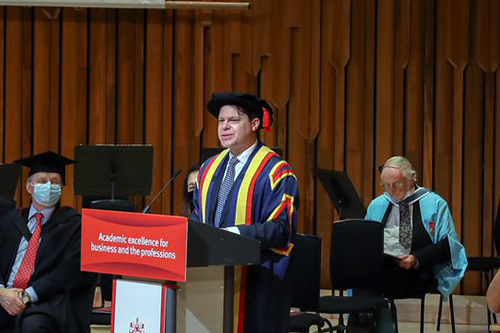"We are used to waiting but I also want to convince you that procrastination can sometimes be a good thing"
"Dear Graduates.
"Let me start by congratulating you for your achievement today, and thanking your family and friends for their support.
"I know you have waited a long time for this day. After all, we are used to waiting. Today, I want to take a look at one form of waiting of which we are all familiar – procrastination. I also want to convince you that procrastination can sometimes be a good thing.
"By nature, we seem to be excellent procrastinators. We try our hardest to put things off for later, even when they are really important to us.
"The American writer Mark Twain recognised this in himself when he quipped: “Never put off till tomorrow what you can do the day after tomorrow". I think you all know what he means.
"Our tendency to procrastinate was also a problem which troubled the Nobel Prize-winning economist, George Ackerlof.
"As a young man, Ackerlof spent a year living in India and was visited by another Nobel Prize-winning economist, Joseph Stiglitz. When Stiglitz returned to the US, he left a box of clothes and Ackerlof promised he would mail the box of clothes back to him – but there was a hitch. Ackerlof would have to take the box to the post office, wait in line, fill in loads of bureaucratic forms, then come all the way home. He could waste a whole day doing this.
"Each morning, Ackerlof would wake up and make a resolution to send off Stiglitz’s box of clothes. That box remained sitting on his floor for eight months until a friend finally sent it off with some other things they were sending back to the US.
"This experience led Ackerlof to ask himself why we procrastinate. His answer? Humans place a very high value on even the smallest costs and gains in the here and now. We also put a very low value on very large costs and gains which might come in the future. Economists call this temporal discounting.
"According the Ted O‘Donaghue and Matthew Rabin, we procrastinate because we are ambitious. Our life is full of many things we could do, which means we face choices between things which are less important or things which are more important. Many of us are ambitious so we pick the more worthwhile activity.
"We all know procrastination is bad. It means we don’t take small actions today which will have a huge benefit in the future, and leaves us with a long list of to-do tasks which we wake up worrying about at 3am. Procrastination robs us of our sense of agency. When we put things off we start to feel like no matter how hard we try, we can’t seem to achieve anything.
"While we know what costs of procrastination are, we often forget it has some upsides. One 2005 study found that there were actually two different kinds of procrastinators. There are passive procrastinators who go by instinct, which generally means they avoid hard but potentially rewarding task, then there are the active procrastinators. These people realise they can’t do everything, so they will have to procrastinate on something. The research team found active procrastinators tended to perform much better and feel better about themselves.

"Procrastination can also help us make better decisions. This is what the legal scholar Frank Partnoy found when he looked at research on elite tennis players. Partnoy noticed one of the most striking differences between good players and the very best players was how long they waited to hit a ball back. The very best players waited longer and swung quicker. It meant they had a few additional milliseconds to gather information and make a decision about where the ball should go.
"Those milliseconds would often give them a competitive edge. Amateurs immediately swing into action, while real pros procrastinate a little before committing themselves.
"There is final upside of procrastination. It forces us to ask big questions about how we spend the 4,000 weeks we have on this earth during an average lifetime.
"As Canadian philosopher Mark Kingwell says, “Procrastination arises from a sense that there is too much to do, and that no single aspect of the to-do is worth doing. Underneath the rather frantic form of activity is the much more unsettling question whether anything is worth doing at all.”
"On many a rainy Tuesday afternoon, you will find yourself procrastinating and asking yourself these questions. If you do, please remember the advice Swiss Psychoanalyst Gustav Jung gave to one of his clients:
“Quietly do the next and most necessary thing. So long as you think you don’t yet know what that is, you still have too much money to spend on useless speculation. But if you do the next and most necessary thing, you are always doing something meaningful and intended by fate.”
"So now we have procrastinated for too long. Let’s get on with it and do the next and most necessary thing – which is for you to graduate – at last.
"Dear Graduates, congratulations once again on your amazing achievement."
